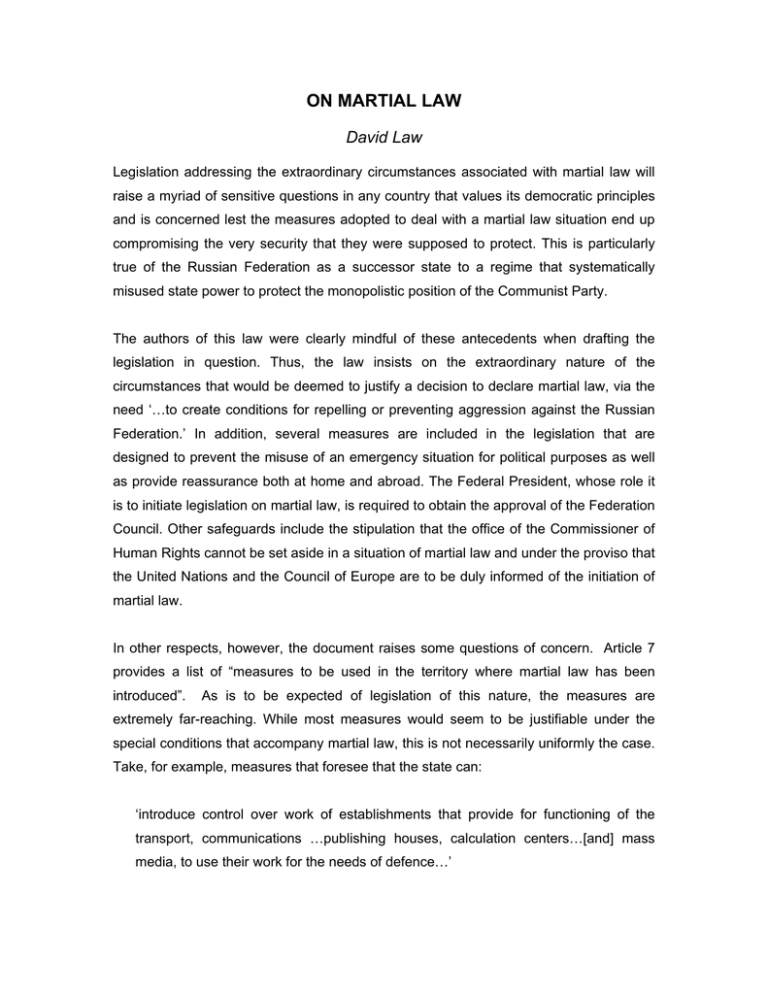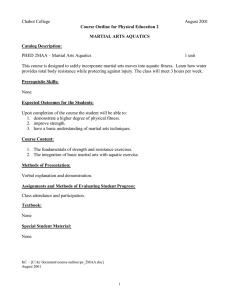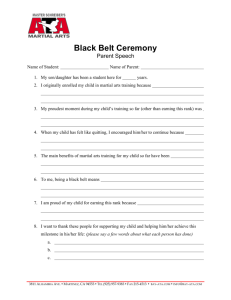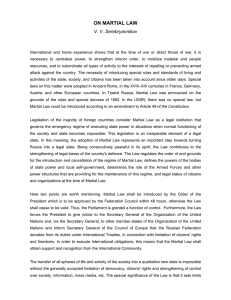ON MARTIAL LAW David Law
advertisement

ON MARTIAL LAW David Law Legislation addressing the extraordinary circumstances associated with martial law will raise a myriad of sensitive questions in any country that values its democratic principles and is concerned lest the measures adopted to deal with a martial law situation end up compromising the very security that they were supposed to protect. This is particularly true of the Russian Federation as a successor state to a regime that systematically misused state power to protect the monopolistic position of the Communist Party. The authors of this law were clearly mindful of these antecedents when drafting the legislation in question. Thus, the law insists on the extraordinary nature of the circumstances that would be deemed to justify a decision to declare martial law, via the need ‘…to create conditions for repelling or preventing aggression against the Russian Federation.’ In addition, several measures are included in the legislation that are designed to prevent the misuse of an emergency situation for political purposes as well as provide reassurance both at home and abroad. The Federal President, whose role it is to initiate legislation on martial law, is required to obtain the approval of the Federation Council. Other safeguards include the stipulation that the office of the Commissioner of Human Rights cannot be set aside in a situation of martial law and under the proviso that the United Nations and the Council of Europe are to be duly informed of the initiation of martial law. In other respects, however, the document raises some questions of concern. Article 7 provides a list of “measures to be used in the territory where martial law has been introduced”. As is to be expected of legislation of this nature, the measures are extremely far-reaching. While most measures would seem to be justifiable under the special conditions that accompany martial law, this is not necessarily uniformly the case. Take, for example, measures that foresee that the state can: ‘introduce control over work of establishments that provide for functioning of the transport, communications …publishing houses, calculation centers…[and] mass media, to use their work for the needs of defence…’ ‘…introduce military censorship over mail and messages [and ]…create bodies of censorship…’ ‘..forbid or limit the departure of citizens outside the territory of the Russian Federation…(and)’ ‘…introduce additional measures that are aimed at strengthening the regime of secrecy in the bodies of state power’. One cannot exclude, of course, that steps of this kind might prove necessary in one or the other set of extraordinary circumstances. What is disconcerting is that the default position in this text appears to assume that an increase of state power in an emergency is necessarily a desirable option. For example, it is questionable whether the interests of the state and its citizens would be well served by a shutting out of the press or restrictions of all kinds being placed on the circulation of information, or by the assumption by state bodies of control over jurisdictions that they are not normally accustomed to supervising, let alone directing. Societies, not least those under serious duress, need to know what is going on; their governments need to know that those they govern have confidence in the information that is generated by official instances. Similarly, when coping with martial law, the broader interest may best be served if jurisdictions are left to operate autonomously, under the overall authority of the government. The state and its bureaucracy latter will have enough to do in an emergency without becoming involved in matters of which they have little notion. This is a policy course that becomes that much more realistic if those jurisdictions that are likely to play key roles in a situation of martial law have had the opportunity to practice cooperation in simulated emergencies in peacetime. Chapter Three of the legislation addresses the question of the special powers of state authorities at a time of martial law, listing inter alia, the powers of the President. The problem is not that these are wide-ranging in nature. Rather, it is that the powers given to the President in Article 12 under this chapter do not appear to be subject to the stipulation given in Article 4, and mentioned above, to the effect that the President’s actions must be approved by the Federation Council. For instance, one reads that the ‘President can suspend the activity of political parties, other public associations, religious formations that conduct propaganda and/or agitation and any other activity that undermine defense ands security of the Russian Federation at the time of martial law.’ The President’s discretion would also appear to be very wide when there is a question of terminating martial law. Article 21 foresees that it is the President who decides when martial law is to be brought to an end. This raises another issue that is not considered in the legislation, namely, that special powers given to the government should be subject to periodic review. For example, it might be appropriate for the legislation initiating martial law to stipulate how long this could be in effect without the President having to seek its renewal. A particularly interesting aspect of the law concerns the kind of aggression that can give rise to a declaration of martial law. Approved by the Duma in December 2001, and by the Federation Council in January 2002, the legislation restricts the possible grounds for aggression undertaken by a foreign state or a group of foreign states. It would, therefore, not be possible to declare martial law in Chechnya owing to the military activities of the irregular Chechen military formations alone. If, however, a foreign country were to send ‘armed gangs, groups, irregular forces or hirelings’ to use force against the Russian Federation, this would constitute aggression of the type that could justify the declaration of martial law.





